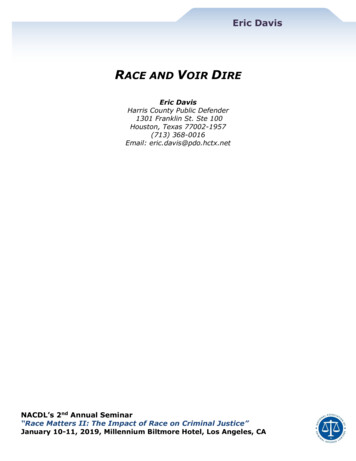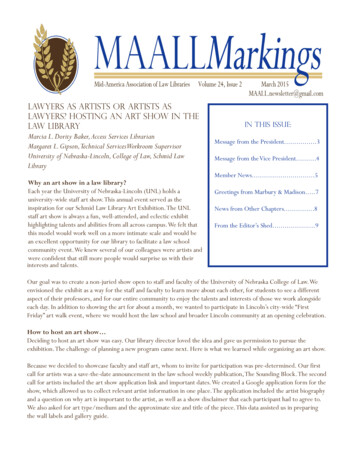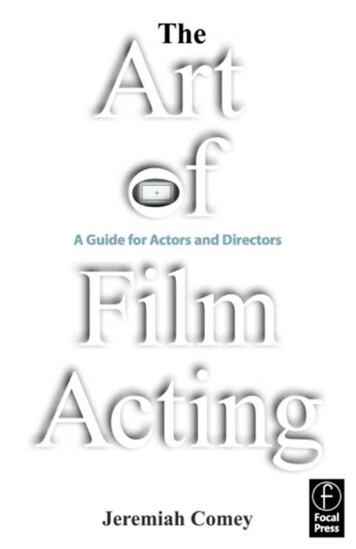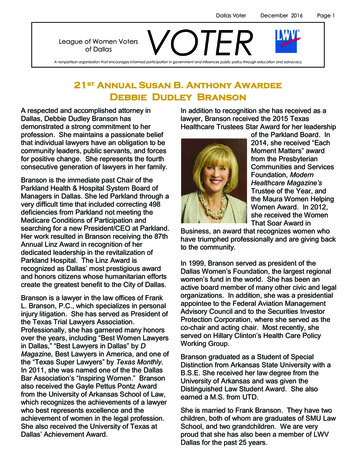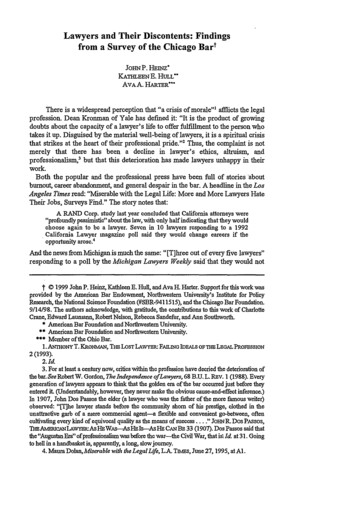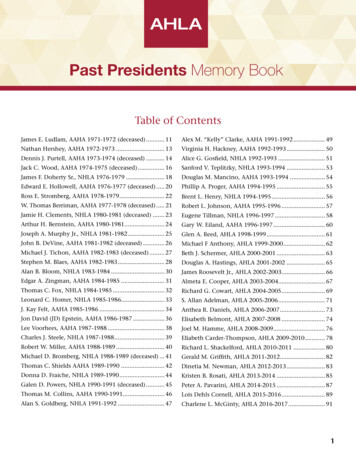
Transcription
LAWYERS ACTING AS GUARDIANS: POLICYAND ETHICAL CONSIDERATIONSEdward D. Spurgeon*Mary Jane Ciccarello**I. INTRODUCTIONPlenary guardianship is an extreme measure; the appointment of a guardian can result in the serious deprivation of aperson’s rights.1 In the best of circumstances, a person of severelydiminished capacity may be well served by a trustworthy andconscientious guardian who acts as a protector and advocate.2 In* 2002, Edward D. Spurgeon. All rights reserved. Edward D. Spurgeon isProfessor of Law, University of Georgia, and Executive Director of the BorchardFoundation Center on Law and Aging.** 2002, Mary Jane Ciccarello. All rights reserved. B.A., Barnard College, 1975;M.A., Columbia University, 1976; J.D., University of Utah College of Law, 1993. MaryJane Ciccarello is the Legal Services developer for the Utah State Division of Aging andAdult Services and the 2001–2002 Fellow of the Borchard Foundation Center on Law andAging.ABA Model Rules of Professional Conduct 2002, American Bar Association.Reprinted with the permission of the American Bar Association. Copies of the Model Rulesof Professional Conduct, 2001 Edition are available from Service Center, American BarAssociation, 750 North Lake Shore Drive, Chicago, Illinois 60611-4497, 1-800-285-2221.1. One state legislature cautioned, “The Legislature finds that adjudicating a persontotally incapacitated and in need of a guardian deprives such person of all her or his civiland legal rights and that such deprivation may be unnecessary.” Fla. Stat. § 744.1012(2001); see generally Lawrence A. Frolik, Promoting Judicial Acceptance and Use ofLimited Guardianship, 31 Stetson 735 (2002) (regarding the distinction between plenaryand limited guardianships).2. One report surveyed the guardianship system in Illinois:Guardianship has many aspects which, when it is undertaken carefully, make itan ideal mechanism for protecting the rights of persons with decisionalimpairments. Well-trained and dedicated guardians can be vigorous advocates forthe wards for whom they are responsible. They can protect them from financialexploitation, obtain services for them, and ensure that healthcare decisions aremade in a timely and responsible fashion. In an ideal guardianship system, notonly are there skilled guardians available for persons with decisional impairments,but the court also has the time and resources to supervise the guardian to ensureproper decision-making and the protection of the ward’s interest.Illinois Guardianship Reform Project: Final Report 1 (Equip for Equal. 2001) [hereinafter
792Stetson Law Review[Vol. XXXIthe worst of circumstances, the guardian might deprive the wardof any meaningful participation in the decisions that affect theward’s life and might even exploit and abuse the ward.3Essential questions in any examination of guardianshipissues are who is acting as guardian, what are the guardian’sspecific duties and responsibilities, and are the guardian’s powerslimited to areas in which the ward is functionally unable to makedecisions.4 Because the establishment of a guardianship and theappointment of a guardian require judicial intervention, theentire process also always necessitates the involvement oflawyers.The role of lawyers in guardianships varies. The mostcommon role of the lawyer is as legal counsel for either thepetitioner seeking the appointment as guardian or the allegedincapacitated person.5 Lawyers also may serve as guardians adIllinois Report].3. Several studies and commentaries have been published on the issues and problemsconcerning guardianship. Sen. Spec. Comm. on Aging Doc. 101-22, Roundtable Discussionon Guardianship (June 2, 1992); Commn. on Mentally Disabled & Commn. on Leg.Problems of Elderly, Guardianship: An Agenda for Reform — Recommendations of theNational Guardianship Symposium and Policy of the American Bar Association (ABA1989) [hereinafter Wingspread Recommendations]; A. Frank Johns & Vicki Bowers,Guardianship Folly: The Misgovernment of Parens Patriae and the Forecast of ItsCrumbling Linkage to Unprotected Older Americans in the Twenty-First Century — AMarch of Folly? Or Just a Mask of Virtual Reality?, 27 Stetson L. Rev. 1 (1997).4. Florida Statutes Section 744.344 (2001) and New York Mental Hygiene LawsSection 81.02 (McKinney 1996) are examples of state statutes that provide that the scopeof guardianship be limited to the incapacitated person’s areas of diminished capacity. TheUniform Guardianship and Protective Proceedings Act provides that a court “shall grantto a guardian only those powers necessitated by the ward’s limitations and demonstratedneeds.” Unif. Guardianship & Protective Proc. Act § 311(b), 8A U.L.A. 146 (Supp. 2001).See generally Frolik, supra n. 1 (arguing for greater use of limited guardianships as bestserving the needs of a person with diminished capacity without needlessly degrading hisor her autonomy, and arguing against plenary guardianships, which deprive the ward ofall rights).5. The question of the role of the lawyer representing the alleged incapacitatedperson (AIP) has been widely debated. Most commentators have found that an AIP mayface unnecessary restrictions on liberty, due process, and autonomy without a competentand zealous advocate. Elizabeth Calhoun & Suzanna L. Basinger, Right to Counsel inGuardianship Proceedings, Clearinghouse Rev. 316, 317 (Sept.–Oct. 1999) (describing howthe variable procedural safeguards in guardianship proceedings run counter to mostAmericans’ expectations of a judicial proceeding where liberty is at stake); Vicki Gottlich,The Role of the Attorney for the Defendant in Adult Guardianship Case: An Advocate’sPerspective, 7 Md. J. Contemp. Leg. Issues 191, 197–221 (1995–1996) (discussing theliberties that may be unnecessarily restricted without safeguards); Anne K. Pecora,
2002]Lawyers as Guardians793litem and as lawyers for the guardian.6 The role we examine here,however, is that specific one of the lawyer serving in the fiduciarycapacity as guardian.7Traditionally, lawyers serve their clients in many roles:advisor, advocate, negotiator, intermediary, and evaluator.8 ButRepresenting Defendants in Guardianship Proceedings: The Attorney’s Dilemma ofConflicting Responsibilities, 1 Elder L.J. 139, 139–175 (1993) (discussing cases in whichattorneys’ advocacy played significant roles in the outcomes of guardianship proceedings);but see Frederick R. Franke, Jr., Perfect Ambiguity: The Role of the Attorney in MarylandGuardianships, 7 Md. J. Contemp. Leg. Issues 223, 223–237 (1995–1996) (arguing that theattorney should not act as zealous advocate when the AIP needs such representation butshould act in the role of guardian ad litem, or in the best interests of the client, when theAIP is in need of protection). For a further discussion of the role of the attorney whodefends putative wards, see Joan L. O’Sullivan, Role of the Attorney for the AllegedIncapacitated Person, 31 Stetson L. Rev. 687 (2002).6. The meaning of the term “guardian ad litem” changes from jurisdiction tojurisdiction and may include such other terms as “court visitor,” “court evaluator,” and“court investigator.” The role of the guardian ad litem is defined by state statutes and afull discussion of this role is beyond the scope of this paper. While lawyers often serve inthe guardian ad litem role, they are not the only professionals assigned to the role. Fordiscussions of the various issues regarding the role and responsibilities and changingstatutory definitions of guardian ad litem in the context of adult guardianships, consultthe following: James Peden, The Guardian Ad litem under the Guardianship Reform Act:A Profusion of Duties, A Confusion of Roles, 68 U. Det. L. Rev. 20, 26–30 (1990); LeonaBeane, ‘Guardians’ and ‘Guardians ad litem’: What Are the Differences?, (P.L.I. Tax L. &Est. Plan. Course Handbook Series, Guardianship Law: Article 81, Aug. 21, 2001)(available in Westlaw, 308 PLI/Est 239); Illinois Report, supra n. 2, at 22–23. Twocommentators have noted that the notion of guardian ad litem as an agent of the court isbecoming less common:Although a number of states still utilize the concept of a guardian ad litem, themodern trend is toward recognition of the importance of legal advocacy for theincapacitated client. . . . [L]awyers are not primarily witnesses or judicial officers,but advocates for their clients’ wishes. They may also serve as counselors andadvisors, but there is a real difference between counseling a client about the effectof making a choice and telling the judge which choice would be “better” for theclient.Robert B. Fleming & Rebecca C. Morgan, Lawyers’ Ethical Dilemmas: A “Normal”Relationship When Representing Demented Clients and Their Families, 35 Ga. L/ Rev. 735,753–755 (2001) (footnotes omitted).7. “Guardian” here, unless otherwise specified, refers to the fiduciary role of guardianfor an incapacitated person and for that person’s estate, sometimes referred to as“conservator.” Black’s Law Dictionary 300 (Bryan A. Garner ed., 7th ed., West 1999). Therole of guardian here is examined solely within the context of adult guardianships. Theissues of guardianships for minors are outside the scope of this paper.8. The Preamble to the ABA Model Rules of Professional Conduct acknowledges thevarious functions of lawyers:As a representative of clients, a lawyer performs various functions. As advisor, a
794Stetson Law Review[Vol. XXXIshould lawyers serve their clients in other fiduciary roles, astrustees, executors of estate, or even guardians? Are lawyers anybetter suited or trained to serve in other fiduciary roles than areother professionals, such as accountants, bankers, or socialworkers?The concept of the lawyer acting in the specific fiduciary roleas guardian raises a long list of questions and concerns. When dolawyers act as guardians? Should lawyers ever serve asguardians? Is there any good public policy in support of lawyersacting as guardians? If a lawyer is acting as a guardian, shouldthe lawyer also serve in the dual capacity of lawyer for the ward?What ethical and professional standards should a lawyer servingas a guardian follow? What fees can the lawyer as guardian or aslawyer/guardian charge?Lawyers have always served in other fiduciary roles,including that of guardian. There are no ethical rules or laws thatprohibit a lawyer from acting as a guardian, and lawyers oftenserve as guardians.9 This Article explores lawyers serving twobasic functions: either as de facto guardian for a client ofdiminished capacity in Part II, or as court-appointed guardian fora judicially declared incapacitated person in Part III.10 We reviewthe American Bar Association (ABA) Model Rules of ProfessionalConduct,11 the ABA Ethics 2000 changes to the Model Rules,12lawyer provides a client with an informed understanding of the client’s legal rightsand obligations and explains their practical implications. As advocate, a lawyerzealously asserts the client’s position under the rules of the adversary system. Asnegotiator, a lawyer seeks a result advantageous to the client but consistent withrequirements of honest dealing with others. As intermediary between clients, alawyer seeks to reconcile their divergent interests as an advisor and, to a limitedextent, as a spokesperson for each client. A lawyer acts as evaluator by examininga client’s legal affairs and reporting about them to the client or to others.ABA Model R. Prof. Conduct preamble ¶ 2 (2000).9. The Authors have explored many of the ethical and policy issues facing lawyersserving in other fiduciary roles in an earlier article. Edward D. Spurgeon & Mary JaneCiccarello, The Lawyer in Other Fiduciary Roles: Policy and Ethical Considerations, 62Fordham L. Rev. 1357 (1994).10. In the context of guardianships, lawyers also often serve as legal counsel for theguardian. Except in passing, the role of the lawyer as lawyer for the fiduciary is outsidethe scope of this Article. For a discussion of this topic, consult Bruce S. Ross, Conservatorship Litigation and Lawyer Liability: A Guide through the Maze, 31 Stetson L. Rev. 757(2002), and Spurgeon & Ciccarello, supra n. 9.11. The ABA first promulgated the Model Rules of Professional Conduct in 1983.Forty-one states and the District of Columbia have adopted the Model Rules, with some
2002]Lawyers as Guardians795relevant ABA ethics opinions, selected commentary on the ModelRules by the American College of Trust and Estate Counsel,13some state bar ethics opinions, and some relevant case law andcommentaries. At the end of Parts II and III, we make somerecommendations about when, if, and how a lawyer should servein the guardian’s role.The approach here is not to suggest that guardianship is thedesired outcome or preferred method of assisting an adult ofdiminished capacity, but to recognize that guardianships existand that lawyers find themselves dealing with the questions ofwhether to act as guardian and how to act as guardian onceappointed to that role.There is very little guidance about whether lawyers shouldact as guardians and how they should act once appointed asguardian. During the 1988 National Guardianship Symposium onguardianship issues, known as Wingspread,14 the confereesrecognized that attorneys have special roles in guardianships:Attorneys who act as guardians are accountable to the court intwo respects — as a licensed member of the legal professionand as a judicially appointed fiduciary. As attorneys, theyshould abide by rules of professional conduct. As guardians,they should act in accord with state law and the judge’s order.Some of the Wingspread conferees questioned whether suchdual-role attorneys have, or should have, a special duty.Should selected standards for guardians be incorporated intovariations from state to state. Margaret Colgate Love & ABA Ctr. for Prof. Resp., ABAEthics 2000 Commission: Final Report — Summary of Recommendations http://www.abanet.org/cpr/e2k-mlove article.html (June 9, 2001).12. In 1997 the ABA established a Commission on Evaluation of the Rules ofProfessional Conduct to evaluate the Model Rules. Id. On February 5, 2002, the House ofDelegates, at its Midyear Meeting in Philadelphia, Pennsylvania, completed its review ofthe ABA Ethics 2000 recommendations, revising and amending the Model Rules. For acomplete summary of the revisions, see ABA Ctr. for Prof. Resp., Report 401 as Passed bythe House of Delegates February 5, 2002 http://www.abanet.org/cpr/e2k-reporthome.html (Feb. 2002). Revised Model Rules 1.6 and 1.14 are reprinted at 31 Stetson L.Rev. 791, 856–866 (2002). Unless otherwise indicated, all citations to the Model Rules areto the 2001 Edition of the ABA Model Rules of Professional Conduct, published in 2000.13. Am. College of Trust & Est. Counsel, Commentaries on the Model Rules ofProfessional Conduct (3d ed. Am. College of Trust & Est. Counsel 1999) [hereinafterACTEC Commentaries].14. The Johnson Foundation’s Wingspread Conference Center in Wisconsin hosted theNational Guardianship Symposium, which was sponsored by the ABA Commission onLegal Problems of the Elderly and the ABA Commission on Mental Disability.
796Stetson Law Review[Vol. XXXIrules of professional conduct for lawyers? Should barassociations sponsor sessions instructing guardians on theirduties? Again, these questions merit serious consideration andresolution by judicial and bar entities.15The Wingspread conferees also made the following specificrecommendation concerning lawyers:Recommendation V-E, Role of Attorneys:Rules of Professional Conduct — State supreme courts andappropriate bar entities should develop and enforce rules ofprofessional conduct regarding the performance of attorneys inholding guardians accountable — in their roles as guardiansthemselves, in their representation of guardians and in theirrepresentation of wards.Continuing Legal Education — Continuing legal educationsystems and bar publications should address the performance16of attorneys in these roles.Since the 1988 Wingspread Symposium, no state supremecourt or bar association has developed specific rules ofprofessional conduct regarding the performance of attorneys intheir roles as guardians.17 Some local bar associations have issued15. Wingspread Recommendations, supra n. 3, at 26.16. Id.17. There have been attempts by individual courts, jurisdictions, and states to reformlocal court procedures and state guardianship laws; examples include the WashtenawCounty Probate Court in Michigan and the guardianship statutory reforms in Virginia.See John E. Donaldson, Reform of Adult Guardianship Law, 32 U. Rich. L. Rev. 1273(1998) (analyzing guardianship reforms in Virginia in 1997 and 1998); Bradley Geller,Handbook for Guardians of Adults http://www.courts.co.calhoun.mi.us/book037a.htm (accessed Feb. 4, 2002) (explaining to new guardians local court policies and procedures,written by counsel to Washtenaw County Probate Court, copyrighted 1995). No locality,however, has promulgated rules of professional conduct regarding the performance ofattorneys in holding guardians accountable, in their role as guardians themselves, or intheir representation of guardians and in their representation of wards. For a discussion ofthe need to develop a reflective model of professional conduct to resolve the ethicaldilemmas that occur within the practice of elder law, see Joseph A. Rosenberg, AdaptingUnitary Principles of Professional Responsibility to Unique Practice Contexts: A ReflectiveModel for Resolving Ethical Dilemmas in Elder Law, 31 Loy. U. Chi. L.J. 403 (2000). For athorough review of efforts to monitor guardians, see Sally Balch Hurme & Erica Wood,Guardian Accountability Then and Now: Tracing Tenets for an Active Court Role, 31Stetson L. Rev. 867 (2002). The New York State Unified Court System recently releasedtwo reports on abuse by court-appointed fiduciaries, many whom are attorneys. Commn.on Fiduciary Appointments, Report on the Commission on Fiduciary Appointments
2002]Lawyers as Guardians797ethics opinions, usually in the context of lawyers representingclients of diminished capacity and ABA Model Rule ofProfessional Conduct 1.14, and some have conducted continuinglegal and judicial education sessions on guardianship issues.18But there is no uniformity of approach to dealing with the issuesregarding lawyers serving as guardians, nor are there anystandards of professional conduct to guide lawyers serving asguardians.Various commentators have examined the Model Rules in anattempt to provide guidance to lawyers confronting the difficultissues of representing older clients, especially when those clientsmay no longer be capable of making decisions for themselves.19We, too, now turn first to Model Rule 1.14 as a starting point forguidance to lawyers who find themselves in the murky situationof deciding whether to act as a de facto guardian for a rt/fidcommreport.htm (Dec. 2001); Off. Spec.Inspector Gen. for Fiduciary Appointments, Fiduciary Appointments in New York: AReport to Chief Judge Judith S. Kay and Chief Administrative Judge Jonathan Lippman duciary.html (accessed Jan. 27, 2002)[hereinafter New York Reports].18. Infra nn. 59–81 and accompanying text (discussing local bar ethics opinions onconfidentiality in the context of guardianship).19. E.g. James R. Devine, The Ethics of Representing the Disabled Client: Does ModelRule 1.14 Adequately Resolve the Best Interests/Advocacy Dilemma?, 49 Mo. L. Rev. 493,500–509 (1984) (discussing disabled clients generally and the conflicting duties of ModelRules 1.6 and 1.14); Peter Margulies, Access, Connection, and Voice: A ContextualApproach to Representing Senior Citizens of Questionable Capacity, 62 Fordham L. Rev.1073 (1994) (arguing that a lawyer should view incapacitated clients contextually andshould reject paternalism and strict adherence to agency principles); Jan Ellen Rein,Ethics and the Questionably Competent Client: What the Model Rules Say and Don’t Say, 9Stan. L. & Policy Rev. 241 (1998) (detailing the ethical dilemmas surrounding clientincapacity and favoring solutions that avoid ethical dilemmas, such as preventativeplanning); Linda F. Smith, Representing the Elderly Client and Addressing the Question ofCompetence, 14 J. Contemp. L. 61, 73–104 (1988) (analyzing the weakness of the ModelRules in providing ethical guidance, and suggesting practical approaches for interviewingand counseling elder clients); Paul R. Tremblay, Impromptu Lawyering and De FactoGuardians, 62 Fordham L. Rev. 1429 (1994) (allowing de facto guardianship as a necessitywhile warning of the limited ethical guidance provided by the Model Rules) [hereinafterTremblay, Impromptu Lawyering]; Paul R. Tremblay, On Persuasion and Paternalism:Lawyer Decisionmaking and the Questionably Competent Client, 1987 Utah L. Rev. 515(reviewing the options available to the lawyer, favoring attempts to persuade the client toact in his or her best interests while rejecting de facto guardianship); James R. Wade,Recent Developments in Representing Disabled Clients, 136 Trusts & Ests. 35 (May 1997)(reporting on the addition to the commentary of Model Rule 1.14 regarding de factoguardianship).
798Stetson Law Review[Vol. XXXIII. LAWYERS ACTING AS DE FACTO GUARDIANSWhen lawyers encounter clients whose ability to makedecisions comes into question, the lawyers must “strike a delicatebalance between their usual obligation ‘to zealously advocate forthe client’s expressed wishes’ and their obligation not to causeharm to the client.”20 A lawyer may have a client who becomesincapacitated during the course of representation. Or a lawyermay have to deal with a long-standing client who makes renewedcontact and appears now to be incapacitated. Or a lawyer mayhave a new client who is not clearly able to communicate appearin his or her office asking for help.Model Rule 1.14 attempts to address the ethical issuesconfronting a lawyer who must decide how to effectively representa client of questionable capacity, and at what point the lawyercan cross the fine line between acting in the traditional role oflawyer as advocate of the client’s wishes and taking on thefiduciary mantle of a guardian protecting the client from harm.We examine first the rule as it existed at the time of Wingspan —The Second National Guardianship Conference,21 the ABA Ethics2000 changes, relevant ABA ethics opinions, some state baropinions, some case law, as little as it is, and the ACTECCommentaries, the only guidance for lawyers in the specializedarea of trusts and estates practice. We also refer to the several indepth and perceptive analyses by legal scholars of the ethicalissues faced by lawyers dealing with clients of diminishedcapacity.22 Finally, we suggest some recommendations to guide20. Comm. Prof. Resp., A Delicate Balance: Ethical Rules for Those Who RepresentIncompetent Clients, 52 Rec. Assoc. B. City N.Y. 34, 35 (Jan./Feb. 1997) (footnote omitted).21. In November 30, 2001, Wingspan — The Second National GuardianshipConference convened on the campus of Stetson University College of Law. Primarysponsors were the National Academy of Elder Law Attorneys, Stetson University Collegeof Law, and the Borchard Center of Law and Aging. Co-sponsors were the ABACommission on Legal Problems of the Elderly, the National College of Probate Judges, theSupervisory Council of the ABA Section on Real Property, Probate and Trusts, theNational Guardianship Association, the Center for Medicare Advocacy, the Arc of theUnited States, and the Center for Social Gerontology, Inc. At the time of the WingspanConference, the ABA Ethics 2000 proposals were pending final consideration by the ABAHouse of Delegates.22. These scholars include those named in supra note 19. For excellent and in-depthanalyses of a wide variety of ethical, policy, and legal issues that concern therepresentation of clients of diminished capacity, consult Special Issue: Ethical Issues inRepresenting Older Clients, 62 Fordham L. Rev. 961, 961–1583 (1994) (containing articles
2002]799Lawyers as Guardianslawyers inA. Model Rule 1.14: Client under a DisabilityThe starting point for any discussion of lawyers functioningin the role of de facto guardian is Model Rule 1.14. At the time ofthe 2001 Wingspan Conference, the rule stated:(a) When a client’s ability to make adequately considereddecisions in connection with the representation isimpaired, whether because of minority, mental disabilityor for some other reason, the lawyer shall, as far asreasonably possible, maintain a normal client-lawyerrelationship with the client.(b) A lawyer may seek the appointment of a guardian or takeother protective action with respect to a client only whenthe lawyer reasonably believes that the client cannotadequately act in the client’s own interest.231. Model Rule 1.14(a): Maintaining a Normal ClientLawyer Relationship with the ClientAs many commentators and scholars have noted, the ModelRules did not contain adequate provisions for lawyers functioningoutside the litigation construct.24 Model Rule 1.14 was an attemptand recommendations generated by the Conference on Ethical Issues in RepresentingOlder Clients at Fordham University School of Law), and Symposium: Joint Conference onLegal/Ethical Issues in the Progression of Dementia, 35 Ga. L. Rev. 391, 391–834 (2001).23. ABA Model R. Prof. Conduct 1.14. In February 2002, the ABA House of Delegatesrevised Model Rule 1.14, adopting the ABA Ethics 2000 proposed changes. The revisedModel Rule 1.14 is reprinted at 31 Stetson L. Rev. 791, 862. As this Article was written inanticipation of the 2001 Wingspan Conference, the analysis necessarily focuses on ModelRule 1.14 as it existed before the ABA revision, and as it currently exists in those statesthat follow the Model Rules and have not yet considered the ABA action.24. For example, Luther Avery has noted that “lawyer specialists like estate planners[should] develop procedures that will be prudent and productive in the face of rules thatwere not designed with their best interests in mind.” Luther J. Avery, The Rules ofProfessional Conduct for Lawyers Are Confusing, 131 Trusts & Ests. 8, 10 (Apr. 1992).Fleming and Morgan offered further criticism of the Model Rules:The Model Rules applied to the representation of a client with dementia fail toprovide sufficient guidance to an attorney on how to effectively evaluate andrepresent a demented client. Although the Rules admonish the attorney tomaintain as normal a relationship as possible with an incapacitated client, theRules fail to tell an attorney how to do so.
800Stetson Law Review[Vol. XXXIto recognize that lawyers may very well encounter clients who arenot fully functioning adults able to combat on a level playing fieldwith other competent adults who happen to have adverse desires.In particular, a lawyer who deals with an aging clientele knowsonly too well that the likelihood of encountering a client ofquestionable mental and physical capacity is very real.25The very basis of the attorney-client relationship is, on thepart of the lawyer, one of loyalty, confidentiality, and professionalguidance. This basis, however, presumes the full participation ofthe client in the relationship. Another aspect of the attorneyclient relationship is one of principal to agent. Legal traditionholds that when the principal is no longer capable ofcommunicating effectively and participating meaningfully in thelegal action, the agency of the lawyer is terminated.26Are these bases desirable in the context of many elder lawsituations? A lawyer still may be able to maintain client loyaltyand confidentiality, and provide professional guidance, even inthe face of diminished capacity on the part of the client.27 TheFleming & Morgan, supra n. 6, at 740.25. See Smith, supra n. 19, at 61–73 (outlining physical and mental deficienciesassociated with the aging process).26. One scholar explained traditional agency principles:At common law, an agent’s authority under the principal’s power of attorneygenerally terminated upon the principal’s incompetency or death. Termination wasbased on the theory that agency, as a consensual relationship, cannot continuewhen the principal loses the ability to authorize the agent’s actions. Once aprincipal lost competence, no one could legally transact business in the principal’sstead unless appointed the guardian or conservator through judicial process.Linda S. Whitton, Durable Powers as a Hedge Against Guardianship: Should the Attorneyat-Law Accept Appointment as Attorney-in-Fact?, 2 Elder L.J. 39, 43 (1994) (footnotesomitted). Relating agency principles to ethics rules, Devine, supra n. 19, at 513 remarked,“One of the greatest weaknesses of the Model Code is its failure to consider that the entirelegal basis of the attorney-client relationship may be flawed by the existence of a disabilitypreventing the effective creation of an agency.” See generally Alexander M. Meiklejohn,Incompetent Principals, Competent Third Parties, and the Law of Agency, 61 Ind. L.J. 115(1985–1986) (discussing how courts should treat property transactions entered into byagents of incompetent people).27. We do not attempt to define capacity in this Article, as a thorough discussion ofdecision-making capacity is well beyond the scope of this Article. However, we dorecognize that there is no universal standard or definition of decision-making capacity. SeeCharles P. Sabatino, Competency: Refining Our Legal Fictions, in Older Adults’ DecisionMaking and the Law ch. 1, 1–16 (Michael Smyer, K. Warner Schaie & Marshall B. Kappeds., Springer Publg. Co. 1996) (describing various legal tests of incapacity); Robert P.Roca, Determining Decisional Capacity: A Medical Perspective, 62 Fordham L. Rev. 1177
2002]Lawyers as Guardians801appli
The Role of the Attorney for the Defendant in Adult Guardianship Case: An Advocate's Perspective, 7 Md. J. Contemp. Leg. Issues 191, 197-221 (1995-1996) (discussing the liberties that may be unnecessarily restricted without safeguards); Anne K. Pecora, 2002] Lawyers as Guardians 793
